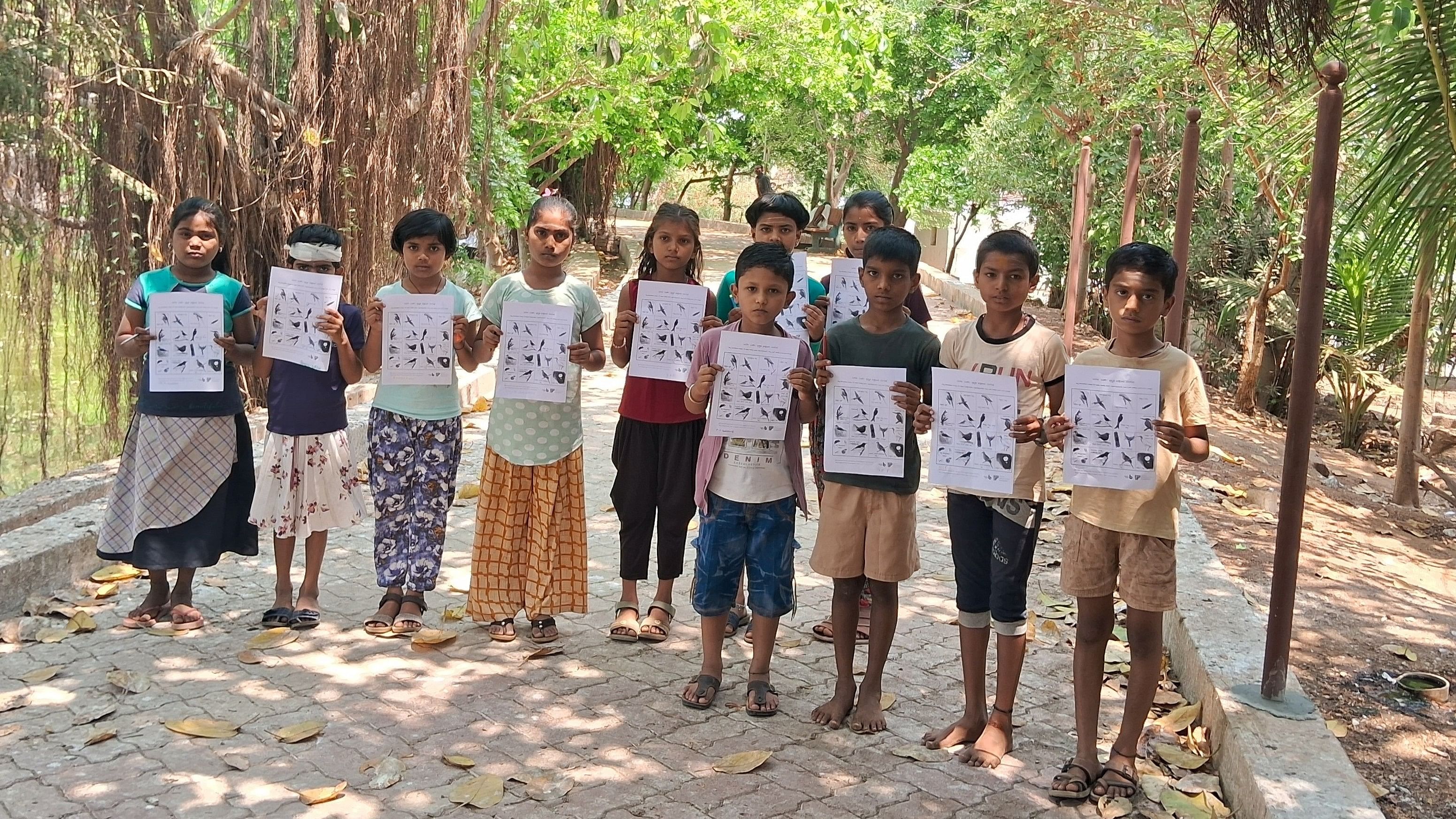
Children display their drawings
Credit: By Special Arrangement
Sitting under the cool shade of the trees surrounding the village library at Mathodu in Chitradurga’s Hosadurga, 13-year-old Manya and her teammate Pratiskha pick a flashcard among the many spread on a platform. The card has a picture of a myna on it. They then turn to Rakesh and Darshan, their peers on another team, and pose a question on the bird’s eating habits.
When the other team answers that a myna eats only fruits, Manya and Pratiksha giggle, knowing that mynas are also insect-eaters. However, other kids sitting around them quickly pitch in with the right answer.
Bhavani B, the librarian at Mathodu has been hosting many such games and fun activities related to birds for the last few days, and the children of the village say they just cannot wait to see what activity has been planned next.
Some 450 km away, at the library in Miragi in Vijayapura’s Indi, children draw a new bird they have observed. Librarian Nagaratna Atnur, who assists them, also introduces them to the habitat of the birds they are drawing.
Bhavani and Nagaratna are among several librarians from across Karnataka who have been slowly introducing children to birdwatching. They hope that the children will, one day, turn into eco-protectors too.
New learnings for educators
Not so long ago, even these librarians hardly observed the birds they would see in the natural environment around them. However, following an intervention by the Mysuru-based Nature Conservation Foundation (NCF) and the Karnataka Rural Development and Panchayat Raj Department, librarians from around 500 gram panchayats have turned into bird educators today.
As many as 12 resource persons conducted a one-day workshop under the Early Bird programme of NCF for the gram panchayat librarians in March. Now, they are helping the educators reach out to children in their villages.
The workshop was conducted district-wise, and around 16 to 20 librarians from each district participated.
NCF has given the libraries the ‘Prakruthiya Pettige’, a specially-designed nature education kit comprising some posters, flashcards, books, creative activities and games. In turn, the librarians are working with children in their respective villages to teach them more about birds.
Under the programme, children are being taught to identify common bird species, learn about their diets, habitats, features, calls and other aspects. The concepts are taught through games, drawing, painting, origami, poetry and bird walks.
“We wanted children to connect to nature through learning about birds. But we also did not want them to just listen to lectures. So, we came up with these fun ideas and education materials involving art and games,” says Abhisheka Krishnagopal, the Early Bird programme manager.
Instead of schools, rural libraries were chosen for this nature education programme as the libraries are non-formal learning spaces where children and grown-ups gather to read and interact, say department officials.
Librarian Yellamma Navadi of Chadchan near Vijayapura, who was part of the workshop, says that despite the summer heat, around 30 to 40 children of the village are attending her session on birds. They are slowly being introduced to various species, including migratory birds, high-altitude flyers, birds that eat fruits, seeds or aquatic plants, and meat and fish-eating birds. They learn about their life cycle, food habits, plumage and other aspects.
“We love playing dumb charades the most. We choose a bird and enact the call or convey other features so that others can guess,” says Malesh Nadur, a high school student attending the sessions at Chadchan.
Rekha Kalshetty, whose daughters are attending these sessions also expresses her happiness: “My kids love going to the library because of the bird education sessions. Now, they can identify more birds than we can. They spend time observing them keenly.”
Librarian Revanna T N of Santhebennur near Davangere says that the workshop was a great learning experience for grown-ups too. “We also got to learn about common birds of the region in local language. We were also taken on a bird walk so that we develop an eye for birds,” he says.
Observing the ecosystem
Deepak, an ecologist, who conducted the training workshops in Ballari and Vijaynagara districts, says that many people assume that birding involves walking through jungles. But there are several ecosystems like grasslands where birds thrive. People just need to be observant, and in order to do that, their curiosity needs to be ignited, he adds.
“The librarians now share pictures and videos of their activities with children and also share information with us on new birds that they have observed, and we discuss their observations,” says Deepak.
Puneet, a software engineer and nature educator who conducted the training sessions for librarians of Uttara Kannada and Shivamogga districts, calls the exercise a conservation effort at the micro-level. “This project might inspire children to develop an interest in ecology and take it up as a career. Awareness is the key, and this is what we have been working on,” he says.
Abhisheka adds that their task is not restricted to training alone. They evaluate how the librarians are implementing the sessions and ask them to submit reports on what they have observed. The teams hope to hold some more sessions for these librarians so that they dive deeper into the topic.
Many of these librarians are now planning to host sessions during summer camps in May.
Looking at the response the Early Bird programme has received, and how children are learning, the department is also planning to extend the programme to more libraries.